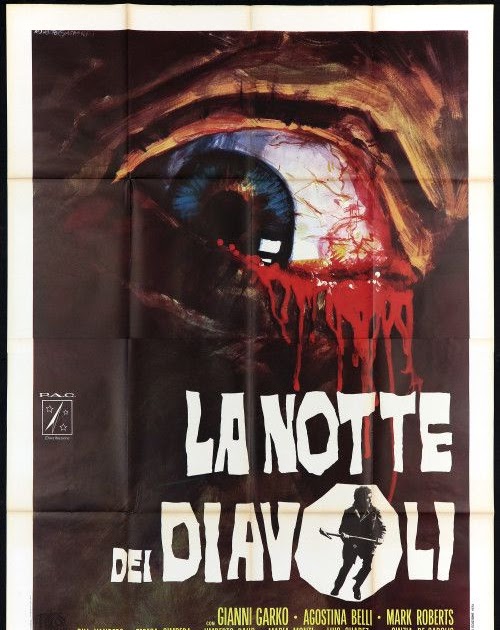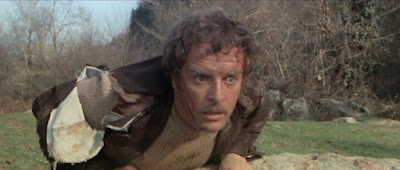Night of the Devils (La notte dei diavoli) was directed by Giorgio Ferroni and was based on Aleksey Konstantinovich Tolstoy’s 1839 short story Sem’ya vurdalaka (The Family of the Vourdalak).
It begins with a young man in hospital in Italy. We will later discover that his name is Nicola. He was found wandering in a confused state. He may have crossed over the border from Yugoslavia. At times he seems quite normal but he panics when the lights are turned out. Various tests are carried out but they’re inconclusive. He may be suffering from amnesia.
A young woman visits him in hospital. She claims to have met him a week earlier. She is concerned about him. When he sees her he freaks out completely.
We then get his story in a flashback. He was driving in the country and swerved his car to avoid hitting a woman. His car is now undriveable and the woman has vanished. He asks for help from the inhabitants of a nearby cottage. The head of this little household seems surly but since he has just buried his brother that might be understandable. We, the audience, witnessed the burial and it was rather strange.
The man lives with his grown-up sons and daughters. Also living here are the brother’s pretty young widow and his children. There’s some tension with the oldest of his sons.
Nicola is welcome to stay but he must not leave the cottage after nightfall and must on no account unbar the windows. There is a knocking at the door, but everybody assures Nicola that it is just the wind.
It’s as if Nicola has found himself back in the Middle Ages. These people have no electricity, no telephone, they have never seen a television, they have no motor vehicles. And they appear to be steeped in superstition. The children tell Nicola about the witch that tries to enter the house every night. Nicola hears varying accounts of the death of the brother.
The old man decides to put an end to the curse once and for all. If he can. If he fails it will mean disaster.
Nicola is a city boy. He thinks this stuff is all nonsensical superstition. And of course he may be right. He has seen and heard some strange things but they all could and almost certainly do have perfectly rational explanations. That’s what he is determined to believe.
Things get complicated when a tentative romance blossoms between Nicola and one of the daughters, Sdenka (Agostina Belli).
Nicola is confronted by some extreme acts of violence but it’s still possible that the violence is driven purely by superstitious fears. He is definitely anxious to get his car back on the road. Things are getting too disturbing for him. He’s not exactly frightened, yet. It has crossed his mind that it would be a good idea to leave and take Sdenka with him.
A conversation with an old man in the nearby village gives him some more information. The old man tells him of the legend of the Vourdalak. The vourdalak are not exactly vampires, but there are similarities. When the original story was written in 1839 there had been vampire stories such as Polidori’s The Vampyre (1819) but the vampire was not yet established as a major literary trope. There was however a growing interest in both folklore and the occult and vampire-like monsters such as the succubus and the lamia had attracted the attention of writers. There are also mentions of witches in the movie so it was drawing on various occult influences.
When the real horrors kick in they do so in a big way. There’s a fair amount of gore but it’s the stifling atmosphere of fear and suspicion that really makes the horror work.
The twist ending is not entirely unanticipated but it still packs a real punch.
There’s also plenty of eroticism, some of it being perhaps not entirely healthy. The vourdalak is a more overtly sexual monster than the vampire. And perhaps a monster driven more by emotion than by bloodlust.
Night of the Devils is both very effective and very interesting gothic horror with the transposition of mediæval beliefs into the modern world being done pretty well. Highly recommended.
Giorgio Ferroni is better known for his superb 1960 gothic horror film Mill of the Stone Women which I also highly recommend.
The Raro Video DVD looks great (they’ve also released this film on Blu-Ray).a




